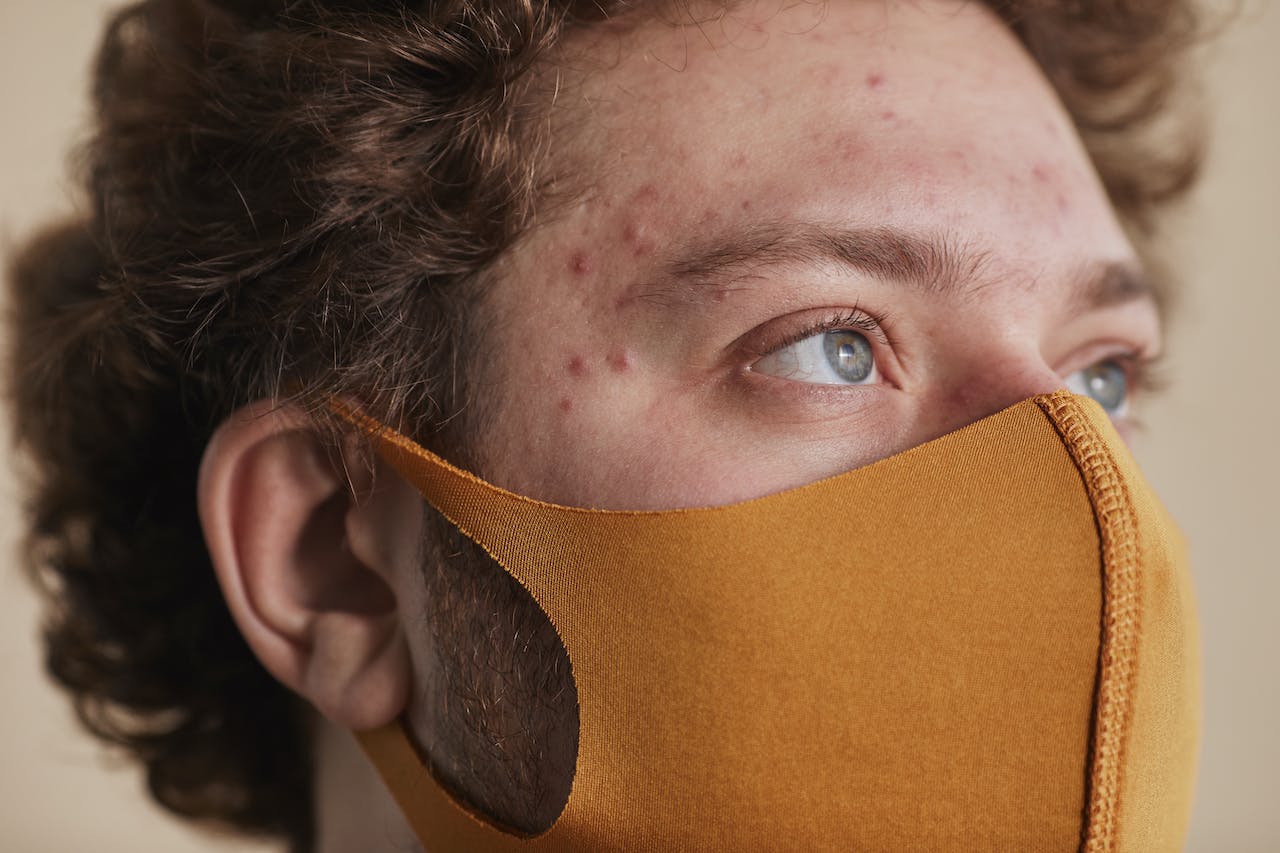Unraveling The Mysteries Behind Iodine Acne
Iodine Acne, a term that often perplexes individuals seeking a clearer complexion, has garnered significant attention in recent years. When it comes to skincare concerns, Iodine Acne can be a frustrating and persistent issue for many.
Author:Suleman ShahReviewer:Han JuNov 09, 20232.6K Shares126.6K Views

Iodine acneis a skin condition that is often overlooked but can be a significant source of frustration for those who suffer from it. Acne is a common skin problem, but the role of iodine in exacerbating acne is not widely known.
This article will delve into the world of iodine acne, exploring its causes, symptoms, and practical solutions to help you better understand and manage this unique skin issue.
What Is Iodine?
Iodine, often known as iodide, is a kind of mineral that occurs naturally in soil and seawater on Earth. Iodine may be found in many plant-based foods and salt water, although it is most commonly found in iodized salt.
It's critical to consume adequate iodine through food. It controls fetal development, hormones, and other processes. In case of low iodine levels, your physician may suggest taking supplements. It is only advisable to use supplements after first seeing your physician.
Continue reading to discover more about iodine's benefits and drawbacks, as well as age-appropriate daily dosage recommendations.
Promoting Thyroid Health
Iodine is essential for thyroid health. At the base of your neck, the thyroid gland regulates hormone production. Hormones regulate metabolism, heart health, and more.
Your thyroid uses small quantities of iodine to generate hormones. Iodine deficiency reduces thyroid hormone production. An underactive thyroid gland can cause hypothyroidism. Low iodine levels in the US seldom affect thyroid function due to the abundance of iodine in Western diets.
Dairy, fortified meals, and saltwater seafood provide ample iodine. Plant foods grown in iodine-rich soil contain iodine. Using iodized salt to season meals provides the mineral.
Iodine enhances thyroid health, but too much might harm it. This is why you should only use iodine supplements with medical advice.
Reducing Risk For Some Goiters
An enlarged thyroid gland is called a goiter. Either hyperthyroidism or hypothyroidism can cause an enlargement of the thyroid. An overactive thyroid gland is known as hyperthyroidism. Thyroid gland growth can also result from non-cancerous thyroid nodules or cysts.
Occasionally, a goiter arises directly from an iodine shortage. Although it is less frequent in the US and other nations where iodine-rich foods are available, this is the most common cause of goiter globally.
By including more iodine-rich foods or supplements in the diet, goiters caused by iodine can be treated.
Managing Overactive Thyroid Gland
Your doctor may prescribe radioactive iodine for an overactive thyroid. This oral radioiodine is taken. Overactive thyroid cells are destroyed to lower thyroid hormone levels.
Radioactive iodine can kill too many thyroid cells. This can reduce hormone production, causing hypothyroidism. Anti-thyroid medicines frequently fail before radioactive iodine is indicated.
Iodine supplements are not radioactive. Iodine supplements for hyperthyroidism are never advised.
Treating Thyroid Cancer
Thyroid cancermay be treated with radioiodine. It acts like hyperthyroid medication. Oral radioactive iodine kills thyroid cells, even malignant ones. It can be used after thyroid surgery to eradicate all malignant cells.
The American Cancer Society Trusted Source says radioactive iodine therapies greatly enhance thyroid cancer survival.
Improving Cognitive Function
The neurological advantages of iodine during pregnancy could also apply to a child's developing brain. There is also a lower chance of intellectual handicap with this trusted Source.
Your kid probably consumes all the iodine they require from food, but you should speak with their physician if you have any concerns about their iodine consumption.
May Help Treat Fibrocystic Breast Disease
Iodine supplements or drugs may treat fibrocystic breast disease. This non-cancerous disorder frequently affects reproductive-age women and causes painful breast lumps.
Iodine may assist fibrocystic breast cysts, but don't self-treat. Your doctor must prescribe iodine for this ailment. You may have iodine poisoning otherwise.
Treating Infections
Liquid iodine can be used topically to cure and prevent infections. It acts by eradicating microorganisms from minor wounds and scrapes. Newborns shouldn't be exposed to topical iodine. Additionally, burns, animal bites, and severe cuts shouldn't be treated with it.
If your doctor instructs you otherwise, do not use the product for more than ten days. Instead, follow the guidelines on the package for dose information.
The Connection Of Iodine Acne
The relationship between iodine and acne is a complex and often overlooked aspect of skincare. No link between acne and dietary iodine consumption has been found. Only when taking massive amounts of iodine, as those seen in kelp supplements, is there any correlation between the two?
In addition, the acne-like skin reactions caused by excessive iodine consumption aren't actually acne at all, but rather a skin reaction that appears like acne but clears up as soon as iodine consumption is reduced.
Iodine And Skin Health
Natural sources of iodine include food and the environment. Iodine is vital, but too much can damage the skin. Due to its role in excreting excess iodine, the skin is sensitive to iodine-related disorders, including acne.
Iodine And Sebum Production
Iodine affects skin sebum production. Skin sebaceous glands create sebum. Elevated iodine levels can overstimulate sebaceous glands, increasing sebum production. Sebum clogs pores, allowing acne-causing bacteria to grow and cause outbreaks.
Acne Types Associated With Iodine
Iodine-related acne often manifests as specific types of acne lesions, which include.
- Comedones- Iodine acne frequently results in the development of comedones, which are non-inflammatory acne lesions. These may present as whiteheads or blackheads and are commonly found on the face, neck, and chest.
- Inflammatory Lesions- In some cases, iodine-induced acne can progress to more inflammatory lesions, such as pustules and papules. These types of acne can be more painful and cause significant discomfort.
Identifying Iodine-Induced Acne
Iodine-induced acne might be hard to spot since its symptoms match other acne types. If your acne flare-ups are linked to iodine ingestion or exposure, it may be iodine-induced acne. Tracking your food and skin reaction might help you detect this acne.
Who Is Most Susceptible?
- Specific individuals are more susceptible to iodine-induced acne than others. Those at higher risk include.
- Individuals with a pre-existing sensitivity or allergy to iodine.
- People with thyroid disorders, as their iodine metabolism may be altered.
- Those who consume a diet rich in iodized salt, seafood, or iodine-rich foods.
- Patients are taking medications or supplements containing iodine.
Dietary Modifications
- One of the primary steps in managing iodine-induced acne is to reduce iodine intake through dietary modifications.
- Avoiding or limiting the use of iodized salt in meals.
- Reducing the consumption of iodine-rich foods, such as seafood and seaweed.
- Be mindful of food labels to check for iodine content.
How Iodine Affects Acne
TikTokers are using iodine, a medical-grade disinfectant, on acen. A dermatologist has said that while it may be beneficial, it can also cause redness and irritation to the skin. Iodine's impact on acne is a multifaceted and often underappreciated aspect of dermatology.
Iodine - A Double-Edged Nutrient
Iodine is an essential mineral that our bodies need for various functions, particularly in supporting thyroid health. However, when it comes to iodine's role in acne, it can be a double-edged sword. While the body requires iodine for proper thyroid function and overall well-being, excessive iodine intake can lead to unexpected consequences, including acne breakouts.
Managing Iodine-Induced Acne
Effectively managing iodine-induced acne requires a comprehensive approach addressing both the underlying cause and the skin condition itself.
Dietary Adjustments
- The primary step in managing iodine-induced acne is to reduce iodine intake through dietary modifications.
- Limiting or avoiding iodized salt in your meals.
- Reducing the consumption of iodine-rich foods, particularly seafood and seaweed.
- Carefully scrutinizing food labels to identify products with high iodine content.
Medication Evaluation
For individuals taking medications or supplements containing iodine, consultation with a healthcare provider is crucial. They can explore alternative treatment options or adjust iodine dosages to mitigate the risk of acne breakouts.
Topical Acne Treatments
Employing topical acne treatments can help alleviate the symptoms of iodine-induced acne. These treatments may include:
- Benzoyl Peroxide- An over-the-counter acne treatment that effectively reduces inflammationand eliminates acne-causing bacteria.
- Retinoids- Prescription-strength retinoid creams can unclog pores and stimulate skin cell turnover.
- Antibiotics- In more severe cases of iodine-induced acne, topical or oral antibiotics may be prescribed to combat the bacterial infection.
Stress Management
Stress can exacerbate acne, including iodine-induced acne. Managing stress through techniques like mindfulness, yoga, and meditation can help reduce acne flare-ups.
Dermatologist Consultation
Consulting with a dermatologist is essential to ensure personalized guidance in managing iodine-induced acne. A dermatologist can recommend the most suitable treatment plan, monitor your progress, and make necessary adjustments to ensure effective management of the condition.
Different Viewpoints On The Iodine-Acne Connection
The connection between iodine and acne is a subject that has sparked various viewpoints and debates within the medical and dermatological communities.
Historical Beliefs And Traditional Wisdom
Dietary iodine has been linked to skin health in traditional cultures. Some ancient tribes believed iodine-rich foods could heal skin disorders and applied them topically. This implies a longstanding understanding of iodine's possible skin health benefits.
A holistic approach Holistic medicine and natural healing consider iodine essential for general health, including skin health. These methods stress the need of iodine balance and recommend regulating iodine consumption to prevent acne and other health disorders.
The Dermatological Viewpoint
- Iodine-Induced Acne- From a dermatological perspective, there is an acknowledgment of the role iodine can play in triggering or exacerbating acne in some individuals. Dermatologists often diagnose and treat cases of iodine-induced acne, recognizing it as a distinct form of acne that responds to specific treatment strategies.
- Iodine as a Trigger- Dermatologists generally agree that iodine can act as a trigger for acne in susceptible individuals. The mechanism often cited is the influence of iodine on sebum production, which can lead to clogged pores and acne breakouts. Dermatologists emphasize the importance of identifying iodine-induced acne to tailor treatment appropriately.
Scientific Research And Studies
Research- Iodine and acne have been studied to varied degrees. Research shows that iodine affects acne development through sebum production and inflammation. However, the relationship may be complicated, requiring additional study to prove causality.
Iodine and acne have been linked in some research, but not all. The connection is complicated and affected by nutrition, lifestyle, and susceptibility. This unpredictability has caused scientific disagreements.
Dietary And Nutritional Expertise
- Balanced Nutrition- Nutritionists and dietitians emphasize the importance of balanced iodine intake as part of a healthy diet. They often advise against excessive consumption of iodine-rich foods, particularly in those who are prone to acne, as it can be a potential trigger.
- Individual Variability- Dietary experts also highlight the variability in individual responses to iodine. Some people may be more sensitive to iodine and prone to iodine-induced acne, while others may not experience such issues. This individual variability adds a layer of complexity to the iodine-acne connection.
Tips For Managing Iodine Intake
Balancing iodine intake is essential for overall health and can be particularly crucial for those seeking to manage iodine-induced acne or other health concerns related to iodine consumption.
The majority of individuals may obtain adequate iodine by consuming foods high in iodine, such as shellfish. You may enhance your intake of iodine by eating packaged bread and seasoning your food with small amounts of iodized salt.
Evaluate Your Current Iodine Intake
- Dietary Assessment- Start by evaluating your current dietary sources of iodine. Take note of foods that are high in iodine, such as iodized salt, seafood, and dairy products.
- Reading Labels - Be vigilant about reading food labels, especially for processed and packaged foods. Some products may contain iodine additives or iodized salt, contributing to your iodine intake.
Reduce Iodized Salt Consumption
- Switch to Non-Iodized Salt- Consider using non-iodized salt for cooking and seasoning. This simple switch can significantly reduce your daily iodine intake. Non-iodized salt is readily available in most grocery stores.
- Limit Salty Foods- Be mindful of high-sodium processed and fast foods, as they often contain iodized salt. Reducing your consumption of these foods can help lower your iodine intake.
Choose Low-Iodine Alternatives
- Non-Iodized Sea Salt- If you enjoy the taste of sea salt, opt for non-iodized sea salt as an alternative to iodized table salt. It provides a similar flavor without the iodine content.
- Low-Iodine Foods - Incorporate low-iodine foods into your diet, such as fresh fruits, vegetables, grains, and unprocessed meats. These options are naturally lower in iodine.
Monitor Seafood Consumption
- Seafood Moderation -If you enjoy seafood, consider moderating your consumption. Choose seafood with lower iodine content, such as freshwater fish, and limit your intake of iodine-rich seafood, like saltwater fish and shellfish.
- Fresh vs. Canned- Opt for fresh or frozen seafood over canned varieties, as canned seafood often contains higher iodine levels due to canning processes.
Be Cautious With Dairy Products
- Select Low-Iodine Dairy - When consuming dairy, choose low-iodine options, such as non-iodized milk, cheese, and yogurt. These alternatives are available in many grocery stores.
- Explore Non-Dairy Alternatives- If you find it challenging to locate low-iodine dairy products, consider exploring non-dairy alternatives, such as almond milk or coconut-based products.
Iodine Supplements
If you have a specific medical condition that requires iodine supplementation, consult your healthcare provider for guidance on the appropriate dosage and monitoring.
Regular Monitoring
For individuals with thyroid conditions or those who need to monitor their iodine intake closely, regular check-ups with a healthcare professional are essential. This ensures that your iodine levels are within a healthy range.
Stay Informed
Keep yourself informed about iodine sources and nutritional choices. Staying educated on the iodine content of various foods and being mindful of your dietary choices can help you effectively manage your iodine intake.
Lifestyle And Acne Management
Acne is a common skin condition that can affect individuals of all ages. While there are various medical treatments available, lifestyle factors play a significant role in the development and management of acne.
Tips For Effective Acne Management Through Lifestyle Changes
- Dietary Modifications - Consider adopting a diet rich in fruits, vegetables, and whole grains while reducing the consumption of high-glycemic foods and sugary snacks. A well-balanced diet can help regulate blood sugar levels and reduce inflammation associated with acne.
- Hydration- Ensure you drink an adequate amount of water throughout the day to keep your skin adequately hydrated. Herbal teas and water-rich foods like watermelon and cucumber can also contribute to your hydration.
- Regular Exercise- Engage in regular physical activity. Exercise promotes blood circulation, reduces stress, and supports overall well-being. Sweating during exercise can also help clear pores, reducing the risk of acne breakouts.
- Adequate Sleep- Prioritize quality sleep by maintaining a consistent sleep schedule. Aim for 7-8 hours of sleep each night to allow your body to recover and rejuvenate.
- Sun Protection- Protect your skin from harmful UV rays by wearing sunscreen daily. Sunburn and UV exposure can worsen acne and lead to skin damage.
- Avoid Touching or Picking- Refrain from touching your face and picking at acne lesions. These actions can introduce bacteria, worsen inflammation, and potentially lead to scarring.
- Consult a Dermatologist- If your acne is persistent, severe, or causing emotional distress, consult a dermatologist. A dermatologist can recommend personalized treatment options and monitor your progress.
Iodine Acne - FAQs
What Is The Role Of Iodine In The Formation Of Iodine Acne?
Iodine can lead to iodine acne by increasing oil production in the skin, clogging pores, and promoting the development of acne lesions.
Are There Any Specific Foods That Should Be Avoided To Prevent Iodine Acne?
Foods high in iodine, such as seafood and iodized salt, should be consumed in moderation to reduce the risk of iodine acne.
How Does Iodine Impact Thyroid Health And Iodine Acne Simultaneously?
Iodine is essential for thyroid health, but excessive iodine intake can lead to iodine-induced acne by disrupting skin oil production.
What Are The Primary Differences Between Iodine Acne And Other Types Of Acne?
Iodine acne often presents as whiteheads and blackheads, primarily on the face, neck, and chest, with a solid correlation to iodine consumption.
Can Iodine-induced Acne Be Effectively Managed Without Dietary Changes?
Managing iodine-induced acne often requires dietary modifications, but dermatological treatments and skincare routines can also play a crucial role in its management.
Conclusion
Iodine acne, a specific form of acne associated with elevated iodine intake, highlights the intricate relationship between dietary choices, skincare routines, and skin health. Managing iodine acne involves balancing iodine intake, making dietary modifications, adopting a skincare regimen, and considering lifestyle changes. By understanding the diverse perspectives surrounding iodine acne, individuals can take proactive steps to address this unique skin concern and achieve clearer, healthier skin while maintaining iodine intake at an optimal level.

Suleman Shah
Author
Suleman Shah is a researcher and freelance writer. As a researcher, he has worked with MNS University of Agriculture, Multan (Pakistan) and Texas A & M University (USA). He regularly writes science articles and blogs for science news website immersse.com and open access publishers OA Publishing London and Scientific Times. He loves to keep himself updated on scientific developments and convert these developments into everyday language to update the readers about the developments in the scientific era. His primary research focus is Plant sciences, and he contributed to this field by publishing his research in scientific journals and presenting his work at many Conferences.
Shah graduated from the University of Agriculture Faisalabad (Pakistan) and started his professional carrier with Jaffer Agro Services and later with the Agriculture Department of the Government of Pakistan. His research interest compelled and attracted him to proceed with his carrier in Plant sciences research. So, he started his Ph.D. in Soil Science at MNS University of Agriculture Multan (Pakistan). Later, he started working as a visiting scholar with Texas A&M University (USA).
Shah’s experience with big Open Excess publishers like Springers, Frontiers, MDPI, etc., testified to his belief in Open Access as a barrier-removing mechanism between researchers and the readers of their research. Shah believes that Open Access is revolutionizing the publication process and benefitting research in all fields.

Han Ju
Reviewer
Hello! I'm Han Ju, the heart behind World Wide Journals. My life is a unique tapestry woven from the threads of news, spirituality, and science, enriched by melodies from my guitar. Raised amidst tales of the ancient and the arcane, I developed a keen eye for the stories that truly matter. Through my work, I seek to bridge the seen with the unseen, marrying the rigor of science with the depth of spirituality.
Each article at World Wide Journals is a piece of this ongoing quest, blending analysis with personal reflection. Whether exploring quantum frontiers or strumming chords under the stars, my aim is to inspire and provoke thought, inviting you into a world where every discovery is a note in the grand symphony of existence.
Welcome aboard this journey of insight and exploration, where curiosity leads and music guides.
Latest Articles
Popular Articles




